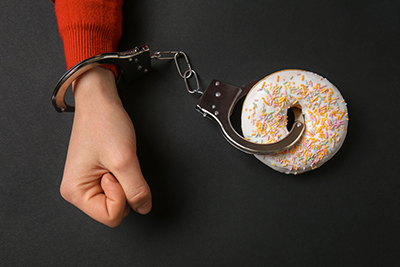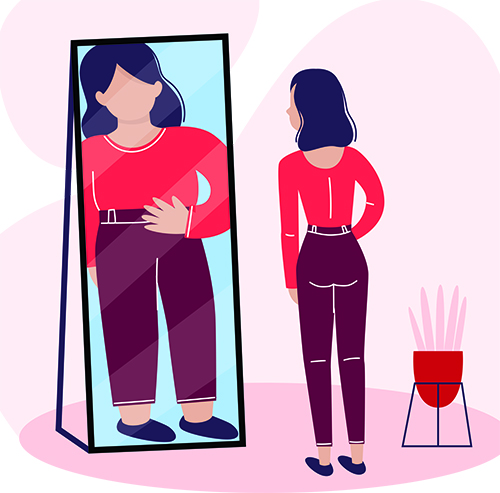Food addiction is a hot topic.
A dietitian sorts the facts from feelings
Posted on December 08, 2020
 On Nutrition
On Nutrition
Food addiction is a hot topic, but the idea that we can become addicted to food in the same way we might become addicted to drugs or alcohol is also very controversial. If you’ve ever thought, “I can’t bring chocolate/ice cream/potato chips into my house, because the moment I start eating them, I can’t stop,” your feelings are very real, but what lies beneath your experience might not be what you think.
I remember when I first encountered the Yale Food Addiction Scale a decade ago, because it seemed like a revelation. It was based on Yale University research suggesting that in people who report food addiction, eating addictive foods trigger brain responses that look very similar to responses to alcohol or hard drugs. But I later learned there’s a problem with that. Many things activate the brain pathways that were designed to release dopamine, aka the “pleasure hormone.” Drugs, alcohol, food, breastfeeding your child, looking at a loved one’s face, listening to music. However, no one worries about music or breastfeeding being addictive.
“Food is meant to be rewarding. Just like sex, it’s evolutionary advantageous to find food rewarding,” said Boston-based registered dietitian Marci Evans. “It’s part of what keeps the human race alive.” However, she points out that there’s no evidence that food is a chemically addictive substance. “Food is far more complex than a single substance like cocaine or alcohol. We eat a mixture of foods and scientists have yet to identify a single ingredient, like sucrose, to demonstrate physically addictive properties in humans. There is still far more that we do not know than what we do know when it comes to the theory of food addiction.”
A response to restriction?
Another problem with food addiction research is that it centers on responses — real or theoretical — to “hyperpalatable” foods high in sugar, fat and sometimes caffeine. Think milkshakes, chocolate, soda, pizza or french fries. Coincidentally — or not — these are the types of foods most likely to be labeled as “bad,” and, let’s face it, forbidden fruit tastes the sweetest.
This seems like a good place to point out that human food addiction studies generally don’t assess attitudes about “good” and “bad” foods, nor do they screen for history of chronic dieting or disordered eating. In fact, the only studies that show true addictive or compulsive behavior are with rodents that have been intermittently deprived of sugar.
“Feelings of food addiction are not uncommon. I see this in my practice all the time and it’s a completely normal response to deprivation,” Evans said. “Interestingly enough, the food addiction research nicely demonstrates with rodents what I see in the clients I work with. When food is restricted, our brains are brilliant enough to create an even stronger reward when we finally do eat those forbidden foods. I’ve had clients describe eating ice cream as similar to getting high. Or the urge and thrill of eating as intense and all consuming as a drug.”
In other words, the more we label certain foods as “bad” and try to avoid them, the more attractive they become. Then, when we do give in, we’re likely to go into Last Supper mode (“I don’t know when I will let myself have chocolate cake again so I better have as much as I can right now”). The experience will feel out of control. If we already think we have a food addiction, these feelings seem to confirm that.
Why abstinence isn’t the answer
Abstaining from “addictive” foods is a common treatment tool, and Evans said that when someone feels trapped in a pattern of restrictive-then-chaotic eating, abstinence may certainly feel like the only option because they’ve lost confidence in their ability to regulate their eating without extreme measures. “Unfortunately, abstinence is likely to prime your brain to become preoccupied with those foods and will likely find them even more pleasurable when you do eat them,” she said. “This is a natural response to deprivation. We are hardwired to fight against it. So unfortunately, abstinence is likely going to keep you going around in circles.”
“While it can be a challenging process, when people stop restricting and food loses that extra charge, the feelings of compulsion and loss of control tend to ease up over time,” Evans said. “I don’t mean to oversimplify this, as food and our relationship to it can become incredibly complex. So navigating intense feelings around food may require professional support.”
The key to working with foods that feel addicting, Evans said, is to begin to introduce them in your diet in a more regular way, with the goal of making all foods routine and predictable. “I’d suggest eating them as part of an adequate and well-balanced diet so hunger and deprivation aren’t driving the bus. Making sure you are eating enough is absolutely essential. Our biological drive to consume enough calories is all about survival and those forces will create a very strong drive to eat.”
I have a client who was absolutely, positively convinced that she was addicted to sugar. I didn’t press the point, but we gradually worked on reintroducing other previously forbidden foods and eating enough food, generally, as well as giving herself permission to fully enjoy a dessert in a “safe” setting, such as at a restaurant. It took time, but as she relaxed her food rules and let herself find pleasure in all sorts of foods — including nutritious foods — and made peace with the necessary role that comfort eating played earlier in her life, her perspective shifted. And, to her surprise, she discovered that she could bake beautiful desserts at home and not feel out of control — realizing that she was never addicted to food at all. Now that’s a happy ending.
Carrie Dennett: CarrieOnNutrition@gmail.com; on Twitter: @CarrieDennett. Carrie Dennett, MPH, RDN, CD is a registered dietitian nutritionist at Nutrition By Carrie, and author of "Healthy For Your Life: A holistic approach to optimal wellness." Visit her at nutritionbycarrie.com.
SEE ALSO:
More Mental Health Articles
Sexual Bias Articles
Race Relations Articles
How Drugs and Alcohol Affect the Brain and Body
WA. Counselor Directory: find a therapist near you
How helpful is this web page to you?
(and how can we can improve this page for you?)
not helpful
very helpful
Other Articles
Eating Disorders for the Curious
Several years ago I worked at Swedish/Ballard Medical Center on the Eating Disorders unit. It was a 10 bed psychiatric unit mostly occupied by women struggling with life threatening illness of anorexia... read more
A Mantra for your short-fuse behavior:
Therapy is not an admission of weakness
“DEAR CAROLYN: I get bent out of shape over petty stuff and I end up snapping at my sweetie. I attribute it to the short-fuse personalities in my family, but, excuses, excuses. &... read more
Complex Trauma
Complex Trauma By Dr. Felicia Mueller, Psychotherapist Complex trauma or Disorder of Extreme Stress Not Otherwise Specified (DESNOS) refers to a condition resulting from exposure... read more
Minding Your Children's Digital Diet
The front page headline of The Seattle Times from October 21, 2016 read, “New Guidelines tell parents: Mind your kid’s digital diet.” The article quotes findings and suggestions put o... read more




.jpg)
